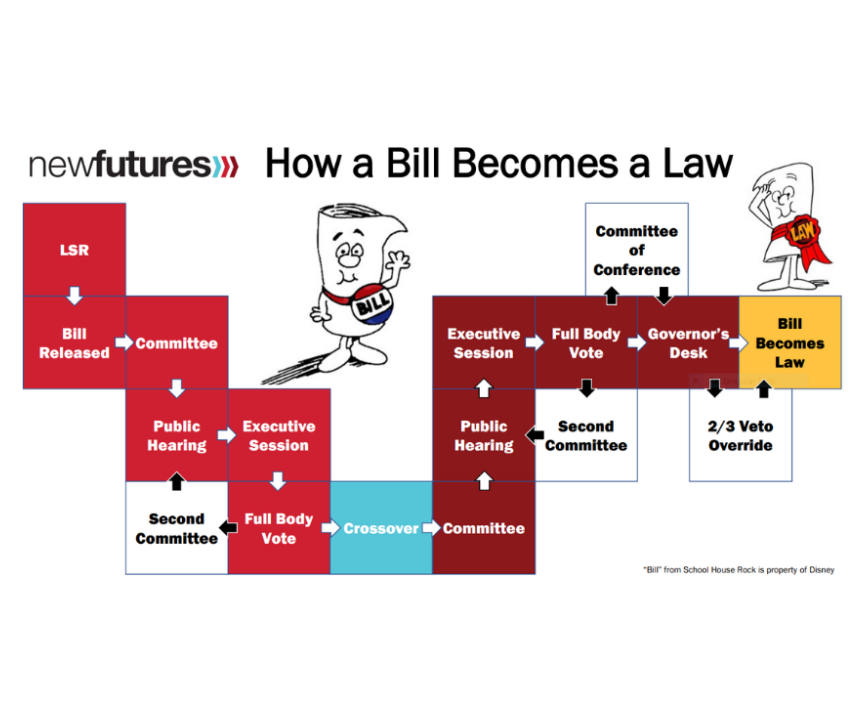
The New Hampshire Legislature
With 24 Senators and 400 Representatives, the New Hampshire General Court is the third-largest legislative body in the English-speaking world. Only the United States House of Representatives and the British Parliament have more representatives than New Hampshire.
Legislators are elected and serve for two year terms (a biennium). The first year of the biennium is a budget year, where they vote on a budget that will fund critical state programs for the next two years. The legislature meets in session from approximately January to June every year.
New Hampshire prides itself on having a “citizen” legislature - Senators and Representatives earn only $100 per year, plus travel stipends.
Because our lawmakers are not paid and they don’t have staffs, it’s important that they hear directly from people on policies that would have an impact on their lives.
How a Bill Becomes a Law
About the NH Legislature
The General Court Website
The GenCourt website is an important advocacy tool. You can look up your legislators and their contact information, search for bills and track their progress, browse all House and Senate committees, view House and Senate calendars, livestream House and Senate sessions, and more at: www.gencourt.state.nh.us
Important acronyms
Bill descriptions
- LSR – Legislative Service Request - what a bill is called before it’s introduced.
- OLS – Office of Legislative Services - a team of lawyers that writes the bill text for the legislators.
- A – Amendment - this means the bill has been edited from it’s original version.
- FN – Fiscal Note - this means the bill has a financial component (like HB 10-FN)
- HB – House Bill - a bill that is filed by a Representative.
- SB – Senate Bill
Committee Recommendations on Bills
- OTP – Ought to Pass: The committee where the bill comes from is recommending that the body (House or Senate) pass the bill. The full House or Senate must vote to accept this recommendation.
- OTP-A – Ought to Pass with Amendment: The committee where the bill comes from is recommending that this bill pass with an amendment. The full House or Senate must vote to accept this recommendation.
- ITL - Inexpedient to Legislate: the committee where the bill comes from is recommending that the body (House or Senate) not pass this bill. The full House or Senate must vote to accept this recommendation.
Other Recommendations:
- Goes to Vote without Recommendation: the committee where the bill comes from did not get a decisive vote on a recommendation. A recommendation will instead be made on the House or Senate floor.
- Refer to Interim Study: the committee woul like the House or Senate to send the bill back to the committee for futher analysis.
- Re-Refer to Committee: A floor recommendation where the House or Senate votes to send the bill back to the committee where it came from for futher analysis.
- Retained in Committee: the committee would like to keep the bill for another year to work on it (can only be retained in year one of the two-year legislative cycle).
- Laid on the Table: a bill can be laid on the table during a House or Senate session before a vote to be picked up at a later time. Each chamber has different rules on how long a bill can be laid on the table for.
Hearing Locations
- SH – State House
- GP – Granite Place – the location of all House meetings and public hearings from September 2025 to October 2026. It is located at 1 Granite Place (South Building) in Concord.
- LOB – Legislative Office Building – where many Committee hearings are held. It is located directly behind the State House. *It is undergoing maintenance and is closed from September 2025 to October 2026.
How A Bill Becomes a Law
-
Legislative Service Request
A Representative or a Senator may sponsor a bill. They file a legislative service request (LSR) with the Office of Legislative Services (OLS). The LSR states the title only. This occurs during the fall prior to the legislative session. -
Bill Test Released
The LSR becomes a bill once it is written by the OLS and approved by the bill sponsor. If the sponsor is a representative, the bill starts in the House and becomes a House bill (HB). If the sponsor is a senator, the bill starts in the Senate and becomes a Senate Bill (SB). The bill will then be assigned a number. It is referred to as “HB/SB #” This occurs during late December and early January. -
Committee Assignment
The bill is assigned to a committee based on its topic. Lists of the committees in the House and Senate can be found on the General Court website. -
Public Hearing
The committee holds a public hearing. Every bill gets a hearing in NH. -
Committee Deliberation
Committee deliberation is done in an executive session that the public may observe. The committee votes on a recommendation for the bill. They may recommend:- Ought to Pass (OTP): the bill should pass.
- Inexpedient to Legislate (ITL): the bill should not pass.
- Ought to Pass as Amended (OTP-A): the bill should pass with an amendment added by the committee.
- Re-refer to Committee: the bill should be studied further in committee during the next legislative session. Only occurs during the first year of the biennium.
- Refer to Interim Study: the bill should be studied further between legislative sessions. If this occurs in the second year of the biennium, the bill dies.
- Second Committee: Sometimes, a bill is sent to a second committee. This often happens if the bill has a fiscal note (FN), meaning there is a financial component to the bill.
-
Floor Vote
The bill goes to the full House or Senate for a vote.
-
Crossover
If the bill passes, it is sent to the other legislative body, and the same process repeats. This occurs during late March and early April.
8-12. Process Repeats
The bill is assigned to a committee, a public hearing is held, the committee votes on a recommendation, and the full legislative body votes on the bill.
- Amended Bills: If the bill passes but includes an amendment approved by the second legislative body that was not approved by the first legislative body, then the bill has two
options.
- The first legislative body approves (concurs) the amendment.
- The first legislative body does not approve (nonconcurs) and the bill goes to a Committee of Conference. This special committee is created to work out the differences between the two versions of the bill. If legislators cannot agree, the bill dies.
Governor's Desk
If the bill passes both legislative bodies, it goes to the Governor. The governor has three choices: sign the bill into law, allow the bill to become law without a
signature, or veto the bill. The Governor’s veto may be overridden by a 2/3 majority vote in both houses. If an override occurs, the bill becomes law.


